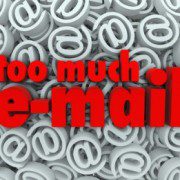Email “addiction” experiment
I tried something new and different this week.
I left my Blackberry at my desk when I closed up shop for the day.
Now, granted, I work from home, so it isn’t such a big issue for me to go back to my desk, check email there, etc. And I can hear my office phone ring from almost every part of the house, so it isn’t as if I was truly disconnected from my office ommunications. Still, I didn’t check email while sitting with my family after dinner, I didn’t do “one last check” of email before I turning off the lights and going to sleep… And I didn’t do my first email check of the day until after I’d had breakfast, showered, and landed at my desk, whereas I usually check it as soon as I wake up.
I ran this experiment mostly as an integrity issue. I’d urged a client not to keep her Blackberry on her bedside table overnight, and then it hit me — that’s what I do, too. Running through the excuses (no, really, I do use it as my alarm clock) didn’t make me feel any better, so I decided to take my own advice.
What did I learn?
The sky didn’t fall in. Not a single client fired me for failure to respond to an email within minutes. (The corollary, of course, is that no client was in the midst of an urgent situation that would have prevented even this experiment.) My down time was my own. I wasn’t distracted, and I didn’t ask anyone to wait while I looked to see whether the latest incoming email needed my attention more immediately than my family did. I was more present for conversation, and I didn’t even consider whether I should check email when I woke up briefly during the night. (Not that I’d ever do that, of course. Often.) I was fully engaged in my personal life, and I returned to my work life with greater gusto in the morning.
I noticed that I felt no angst at all about allowing calls to roll to voicemail, but missing emails did give me great pause. I’ve posted before on the distinction between “urgent” and “important” and I’ve realized that email registers as urgent for me, even though I know that at least 95% of it is not important. How about you?
Imagine the irony when I ran across an article discussing email “addiction.” I put addiction in quotes because, for me, in this situation, that’s slang. Nevertheless, it was a nice experiment, I liked the results, and I think I’ll continue it in some form, though my email-accessible hours may be a bit more extended than they were during the last week.




For some of my coaching clients, “addiction” and “obsession” are not slang…but are actual decriptors of their reality. They talk about not being in “control” when they cannot have access to their electonics; they talk about feeling like they’re in some sort of “free fall” experience when they’re separated from their computer, crackberry, pda, etc. While it may appear absurd, funny, “crazy” and all that on the surface, my sense is that some folks actually relate their separation from such items to “death” in some sensory form, i.e. fear. This often happens when one chooses to put much of their identify into, or become overly attached to, such extrnal elements. The difference between being “attached” and “detached” comes into play here. For the detached, separation is healthy, OK, and not a big deal. For the attached, well, separation can be actually a frightening, upsetting, unsettling and stressful experienece.
Peter, thanks for making this point. I’m aware that it isn’t slang for some people but rather a deadly serious reality, and I appreciate your bringing that to the front. That’s one reason why I wrote this post in the first person, unlike most of my posts — people’s experience may well differ on the effect of detaching from electronics.